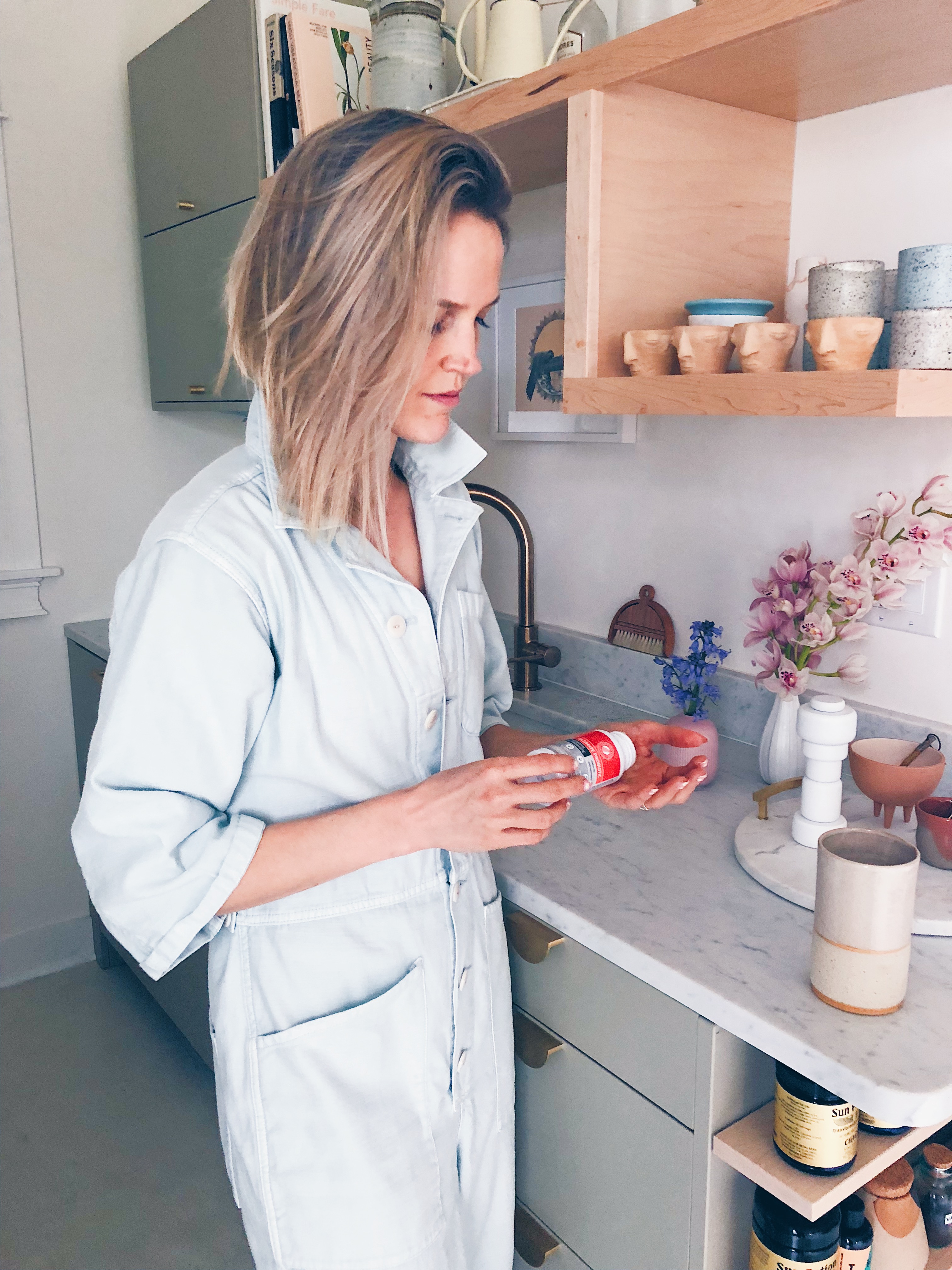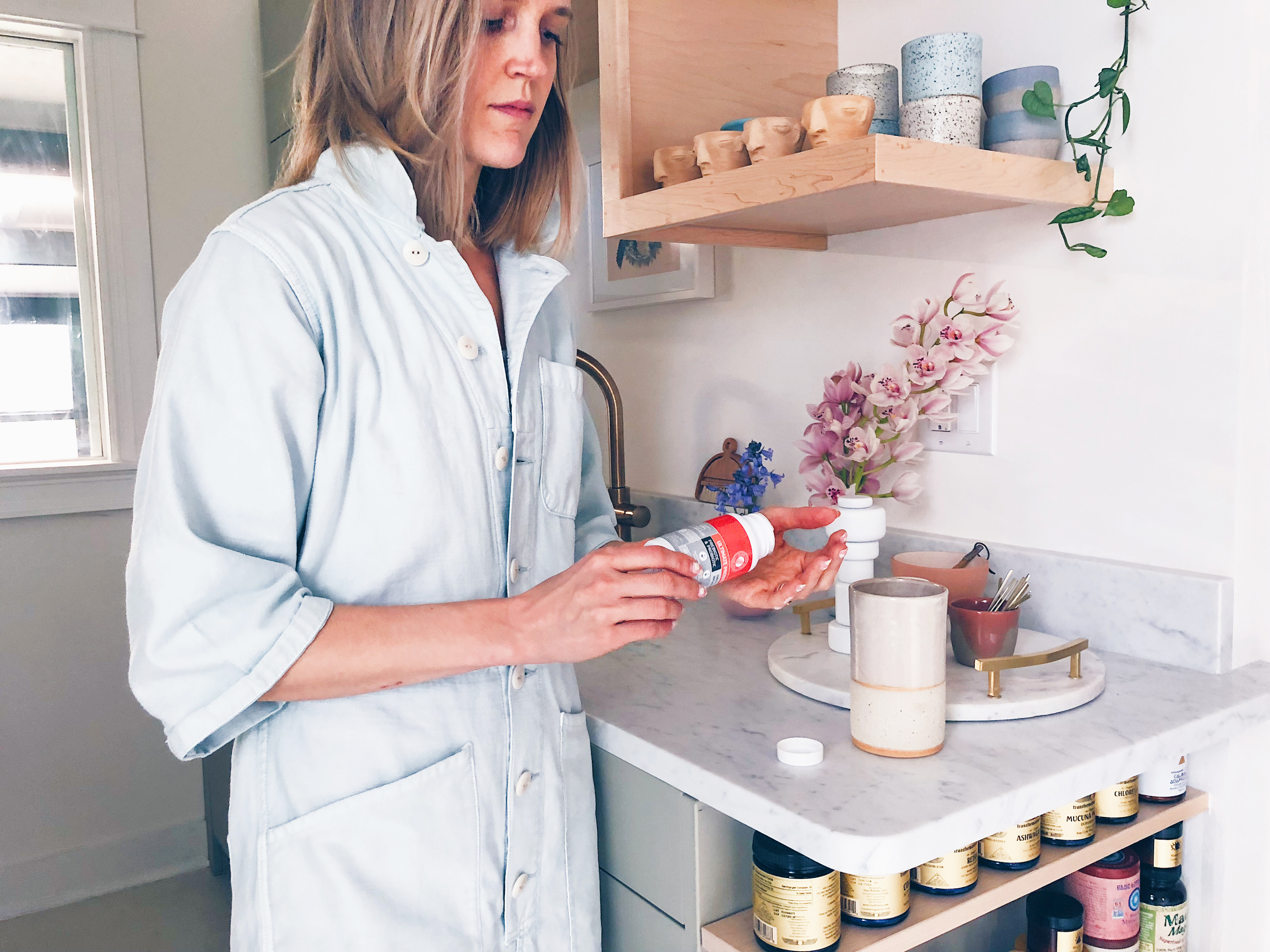My struggle with digestive issues has been life long. It’s debatable whether there was something specific that caused this or if I was just predisposed to it. I feel like it’s probably some combination of both. Repeated antibiotic use as a child, but also being born lactose intolerant. Either way, it’s been a journey, at times very complicated, to get where I am now. And my digestion is by no means perfect, but I’ve learned to manage symptoms, and though it’s something I still deal with, it’s not debilitating or incapacitating. My naturopath believes that people with digestive issues will often deal with them their entire lives. That there’s no magic cure. It’s just about finding a balance and figuring out different healing modalities that help.
This past fall I saw a naturopathic dermatologist after dealing with a 6-month-long flare of perioral dermatitis (read my post about PD here). She immediately brought up SIBO (Small Intestine Bacterial Overgrowth). She said based on my symptoms (skin and digestive) and what she saw work with her other patients that adapting the SIBO Specific Food Guide Protocol and doing rounds of herbal antibiotics may help me. I decided that I would give her recommendations a try because I was literally desperate to clear my skin at that point.
I went back to my regular naturopath before starting the protocol to tell her what had happened and that I was going to try the diet and herbal antibiotics. She wasn’t surprised, as she had already been treating me with a variety of the herbal antibiotics over the past several months without ever bringing up the word SIBO to me (which in hindsight I appreciate). She said she wasn’t a fan of the diet, that she felt it was too restrictive and by starving bacteria in the small intestine, you also run the risk of eradicating any good bacteria as well. She also said she never officially tested me for SIBO because she believes the test is flawed. She very rarely sees someone test negative, which indicates that either everyone has SIBO or that the test is not accurate. For this reason, I never did the SIBO breath test. But nonetheless, I embarked on doing the 8-week SIBO Specific Food Guide Protocol while adding some 17 supplements to my regimen.
Honestly, most of the time I was stressed about what I could or couldn’t eat. I felt like I was failing most of the 2 months. Worrying that maybe I ate 4 pieces too many of butternut squash than I was supposed to. Taking 17 supplements at a time twice a day literally made me feel sick. Unfortunately, the protocol and all the different herbal antibiotics really did not work for me. In fact, in many ways I think they made my digestive symptoms worse. The stress and anxiety I felt caused way more dis-ease in my stomach and gave me more frequent diarrhea. And my skin did not clear up (it eventually did about 2 months after I ended the SIBO protocol through different treatment methods). I would say the only positive thing about doing the diet was that I discovered sensitivities to eggs and almonds, but I could have likely figured that out doing a more straightforward elimination diet.
After coming out of a 2-month period of very, very restrictive eating and a diet that felt like the farthest thing from intuitive that I’ve ever done in my life, I personally do not buy the SIBO hype. I think it’s a trendy diagnosis, and I believe the strict protocol/diet can create deep food fear and disordered eating. I know many people believe that the protocol and antibiotics do really solve their digestive issues. I believe this is only short term. Most people who see results end up with digestive symptoms down the line, whether that’s 6 months later or 2 years later, it depends.
Coming out on the other side of this experience, I’m back to where I started: I believe in a balanced approach to dealing with digestive issues. The following things are what I’ve found to be the most helpful on my journey. These are by no means the only things that help with digestive issues. I recognize that every body is so different, so what may work for me, may not work for you. I think the bottom line is that it takes time, patience, compassion and deep exploration to figure out what will work for you. Overall, remember it’s important to be easy with yourself. Stressing and obsessing over digestion really only makes it worse. Try to find the ease within the effort. Be gentle. Nurture yourself. Eat slowly, chew your food more than feels normal and enjoy the process of slow eating.
[Disclaimer: I am not a doctor. I’m simply sharing what has helped me on my journey. Consulting with a doctor is always the best approach when diving into any of this work for the first time.]
Probiotics:
A high-quality probiotic is key to a healthy gut. I’ve been taking Silver Fern Ultimate Probiotic for the past several months, and I love them. These shelf-stable spore form probiotics are formulated to survive through the acidic environment of your stomach, where most refrigerated probiotics are too fragile to survive. When looking to buy a probiotic, it’s very important to make sure that it has been tested for survivability (so that you’re not just throwing your money away) and one that has been DNA verified (so that you can rest assured that the capsules match the label), like Silver Fern. Regularly introducing good bacteria, like the kinds in the Ultimate Probiotic, will not only help with overall digestive health, but it will also help curb sugar cravings and promote healthy immune function. There is also strong evidence to suggest there is a connection between our guts and our brains. Supplementing with a high-quality probiotic can also help reduce depression and anxiety symptoms. After taking the Silver Fern Ultimate Probiotic everyday, I noticed curbed sugar cravings after about a week and after a month more consistency in my bowel movements. I’ve also noticed the positive effects on my immune system (little to no sickness in the winter months) with taking probiotics consistently over the past several years. Silver Fern is offering you all 15% OFF ANY ORDER with code Wuhaus

Intermittent Fasting:
I’ve been practicing intermittent fasting pretty consistently for several years. Essentially intermittent fasting gives the digestive system a break by fasting for 12-16 hours. I typically eat my last meal of the day around 7/7:30 and then I fast until about 11:30/12 the next day. I eat a breakfast-like meal around 11:30/12 and then I eat a more typical lunch around 3/3:30. I do still drink my morning matcha potion around 8 or 9am and that includes collagen and healthy fats. Intermittent fasting is definitely not for everyone, but I’ve found that intermittent fasting has helped tremendously with bloat and digestive upset when I do eat my meals. If you’ve never tried intermittent fasting, start with a smaller fast of 10-12 hours. If your body reacts positively, you can slowly increase the length of time. It’s important to note that intermittent fasting does not mean you skip meals. It just means that the window of time when you eat your meals is smaller. If you don’t think intermittent fasting is right for you, you could try eating smaller meals/portions throughout the day instead of 3 main meals. I know this method of eating works really well for some people.
Food Combining:
This is something I’ve been really into since this past fall. I’ve found it to be extremely helpful in mitigating bloat and indigestion after meals. I definitely don’t practice this all the time because it can be limiting/restrictive, but I try to be mindful about what foods I’m combining when I’m in my regular routine. The theory behind food combining is that each macronutrient (proteins, carbohydrates and fats) digests at a different rate and requires different digestive enzymes to be broken down. So we create improper food combinations when we eat foods that have opposite digestive requirements at the same time. Improper food combinations can result in symptoms like gas, bloating, belching and abdominal cramps. There are a few ground rules for the food combining model, but I also think it is something to explore on your own since our bodies are all so different. Personally, I find that I can eat fruit with nuts/seeds or with other foods when processed into a smoothie without any problem. Becoming aware of food combining may help you begin to take notice of certain food combinations that don’t sit well with you. If you’re interested in learning more about food combing, I like this chart.
Mayan Abdominal Massage:
We get other forms of massage all the time, but abdominal massage is often overlooked or many people don’t even know about it. We hold so much of our stress and tension in our bellies. We’re taught, especially as women, that everything below the waist should be tight and firm. This leads to so much holding and unnecessary clenching that we aren’t even aware of on a daily basis. Abdominal massage is an amazing way to release tension and give your belly some extra love. It’s really amazing how after a 60-90 minute massage, my abdomen feels way more relaxed and at ease. Maya abdominal massage techniques slowly break down fascia adhesions, scar tissue and remove any ‘kinks’ in the digestive tract. You can also practice abdominal self-massage at home. I’m planning a full blog post with how-to video on abdominal massage coming in the next month or so. Stay tuned!

Castor Oil Pack:
Since I was a little girl, I’ve always love using a hot water bottle at night time on my abdomen. It’s very soothing and has helped me with countless stomach aches over the years. One of my new favorite tummy-care practices is using a castor oil pack with my hot water bottle (or heating pad). There’s a multitude of ways to do this, but the way I learned is to lie down in your bed, apply a thin layer of castor oil onto your abdomen (I use this refillable roll on) – you can focus on specific areas/organs or just apply all over – then place an old towel or cloth you don’t mind getting oil on over the treated area with the hot water bottle or heating pad on top of that. Relax with the castor oil pack for 20-40 minutes. For maximum effectiveness, do this nightly or at least 4 nights a week. Castor oil packs improve circulation and promote lymphatic drainage, which can help the small intestine become more efficient at fat absorption and removing bad bacteria or toxins. This is also a wonderful form of self-care. A time to relax and send healing energy to your belly and digestive track.
Identifying Trigger Foods:
This can be very beneficial. It requires doing some sort of elimination diet and slowly reincorporating foods to see which ones may cause you digestive issues. It can definitely be a frustrating process and requires a level of patience. Take notice of not only foods that trigger symptoms, but quantities. For instance, I’m sensitive to almonds, but only if I eat a lot of them at one time. I can tolerate a small amount each day, but just need to be careful not to overdo it. I did do the US BioTek IgE and IgA tests through my naturopath. I don’t recommend using a food allergy/intolerance test as the only way to discover food sensitivities, as they aren’t 100% accurate, and your experience is always the best teacher. I think using a food intolerance test in combination with an elimination diet would be a smarter approach. Once identified, I recommend eliminating trigger foods for at least 6 months before trying to reintroduce.
Acupuncture + Chinese Herbs:
Acupuncture promotes healing by helping to move stagnant energy in the body. For digestion, an acupuncturist can work with points on the body that speed up metabolism, increase gastrointestinal muscle contraction and relaxation, reduce gastric acid secretion, regulate small and large intestine function and restore stomach acidity to normal levels. Acupuncture is incredibly relaxing for the nervous system. Much like abdominal massage, acupuncture helps to ease tension and stress in our abdomens. Practitioners often prescribe Chinese herbs in conjunction with regular acupuncture treatments to help address whatever imbalances in the body that may be causing your symptoms.
[This post is sponsored by Silver Fern, however, all thoughts and opinions are my own.]



23 comments
Thanks for sharing! I appreciate all of your helpful tips. Some of these I already incorporate but have not tried the castor oil packs yet and am def going to give this a try!!
I would just add that for some of us SIBO is not hype. When I first tested I was in extreme pain and my methane levels were nearly at 100 ppm. That level of methane is highly toxic and can lead to a whole host of issues, including cancer. I was so sick that I lost 15 lbs in 4 weeks and was covered in skin rashes. I agree that SIBO seems to be a very popular diagnosis these days but for some of us, it’s an issue that can’t improve without herbal antibiotics or regular antibiotics. The other tips you recommend are absolutely necessary during and/or treatment and have also helped me heal.
Thanks again for your post and all that you share.
Very educational
Thank you for this amazing post! I’ve been struggling with digestive issues for the past few years and this is SO on point. My functional medicine doctor told me I have SIBO as well as hypochlorhydria, and the amount of pills she wanted me to take was too much for me to handle. I was taking 14 pills with each meal. I would almost fill up on how much water I would have to drink to take everything. I recently decided it wasn’t worth everything I was going through. I don’t even know if it made me feel better. I am also trying to figure out the proper wellness routine that makes me feel the best. Thank you so much for sharing your story! It’s so nice to know I wasn’t the only one who thought it wasn’t worth all of that.
Thank you for sharing!! Dealing with similar stuff and appreciate the insight
Thank you for sharing this article. I’ve struggled with digestive issues for years. I’ve been to many doctors with no clarity or resolution just doing my own reading and trail & error. While I wouldn’t wish this health frustration on anyone, it’s comforting to hear stories from others who struggle with it. Not exactly something you can to to just anyone about. For me a tablespoon of apple cider vinegar every morning has been a game changer for me. I have also found a good probiotic that has helped. And I’ve noticed taking Caprylic acid everyday has helped too. I’m definitely going to try some of your recommendations like the massage and castor oil.
Thanks again ????
One of the most amazing posts I’ve read in a long time! I’m on the exact same journey. I had no idea that my skin condition even had a name! Went on an elimination diet and now introducing foods again- requires SO much patience. I find that regular colon hydrotherapy also really helps.
You know, I’m relieved to hear you and one of your docs came to the the decision that SIBO is still widely misunderstood (trendy tooo) and has flawed testing methods. when I started doing my own research, that was mostly what i was finding too! ok now back to reading the rest of the article.
Thank you so much for this post! I have been struggling with digestive issues for more than 15 years, plus I have fibromyalgia and Hashimoto. I was diagnosed with SIBO in early 2016 and my health went in downhill spiral just as you mentionned. I took so many supplements for months, quit taking probiotics (as it is often recommended) and follow to the T this crazy low fodmap diet…..And I got worse! .I spent thousands on supplements and consultations for nothing. Now, I listen more to myself, try do detox slowly and nourrish my body instead of eliminating and punishing myself for eating an appel because it’s not fodmap. By doing these diets I really altered my microbiome and became depressed and chronically tired. I feel so much better since I started integrating probiotics and fiber in my diet. I’m not healed, I do still have a lot of gaz and bloating, but at least I got my sanity back…and my smile! Thank you.
Great post, and timely. Similar situation to yours and the previous commenters. I’m a type A and a rule follower, so my frustration with myself and the diet was at a level 10 after 6 months. Not helpful. I’ve loosened the reins a bit and feel human again. Consistent meal times, chewing and eating slowly, and allowing for a long digesting period as reduced my gas/bloat drastically. Onions and garlic are still on my do not consume list, but not measuring 1/2 cup of this, 8 pieces of that has brought joy back into my life. Thanks for being a platform for sharing. Cheers to you and your readers
great post! I have a question that you might not know the answer to but I’ve been very curious. Collagen powder and food combining. Do you need to treat it the same as any other protein or is it more neutral?
Thank you so much for this. I was just diagnosed with SIBO with my only symptom being bloating. But I think a lot of that symptom was coming from me switching my diet from paleo to having more dairy and gluten. My numbers were H2: 39 and CH2: 10.
I’ve tried doing the strict diet which is killing me. So strict. I’m still bloated and depressed and stressed beyond. I literally wasn’t this bloated until I got diagnoticed with SIBO. Also, I was taking genestra probiotics which part of me feel created some of the extra bacteria in my body. I wasn’t feeling right but my naturopath kept saying to take it. My bowels were better before I started taking it.
I do have some Dysbiosis flora and candida (barely over), I definetly have to balance myself, but geez.
I’m taking some natural antibiotics now. But not sure I want to continue. I do see an acupuncturist who I adore. I feel like I just see her and that’s it. She thinks the probiotics were too much and doesn’t even understand SIBO.
I did do the intolerance testing too which I think was what originally made me stressed. So much restriction. I love food. Good food. I am so tense eating and deciding. It sucks.
I appreciate this post and makes me feel like I’m not alone.
Thank you.
Christina
Christina, my experience is super similar to yours! I wonder if you’ve found a solution by now, and how? I’ve been experiencing chronic bloating since January, when I tried a combo of probiotics for the first time. Immediately I became bloated and assumed it would disappear when I stopped taking them, but no. I tested positive for Hydrogen-right SIBO. They said it’s possible the probiotics could have activated the SIBO. Now 5 months later, I’m still bloated after experimenting with natural antibiotics (berberine, neem). Nothing seems to take. I’m so stressed over it and just hope this is solve-able and not my new body that I have to get used to. Very curious if you have found anything that works? ????Thanks!
Chloe, there’s no way the probiotics you took created or activated the SIBO. They’re all transient, and disappear from the gut, stool after a few days to a week. My best suggestion is iodine — lugols is probably best. It’s antimicrobial without all the strong herbal reactions one would get from berberine, neem. Start with a drop in a glass of water each day, then increase by a drop till you get to 4-5 drops. After a month or so your symptoms should resolve. Then you might try low histamine probiotics and also resistant starch.
Hi I have same problem taking probiotics as you . I get more bloated feels worse. Especially Lactobacillus acidophillus. Not able to digest most foods except meat protein and select veggies
Thank you for this post (and I loved all the responses too!). You have been one of the only articles I could find speaking about finding balance. I just finished 4 months of low FODMAP, antimicrobals and then antibiotics. I am not worse, but I am not better. I am looking at whether or not to try the elemental diet or just move on and accept what I have and managing the inflammation bucket as well as I can.
I have suffered with an IBS diagnosis from a young age. As I got older I noticed things started to change. I also have GERD and was recently tested positive for SIBO. The SIBO came later and I feel it was brought on by all the GERD meds. Suppressing the stomach acid allows bacteria to migrate into the small intestine but I haven’t been able to come off of them. The symptoms I had were debilitating within 15 minutes of eating literally anything. Tested positive on the blow test. Took the antibiotic and stuck to a FODMAP diet. Still some traces of SIBO at that point so I began taking a high quality collagen. Wow! What a difference! Almost immediately. I also did the intermediate fasting and my first meal I start with a high quality whey isolate protein shake with some berries mixed in. I have the collagen in my coffee in the morning. I have a high protein whey isolate (high quality) shake between 11am and 12. After that I take my first GERD pill. Lunch around 2pm. Gym after work at 6pm and get home around 7pm to 7:30pm and have my last meal/snack and my second GERD pill. I feel the collagen has been the biggest help out of anything I have tried. I have gotten off Bentyl and some other meds. My tummy feels the best it has in ages. My tummy is no longer distended unless I accidentally eat something that I shouldn’t but it seems to pass faster then before. I hope everyone here give collagen a try and hope you get the results I have. Just make sure it is a good quality, grass fed bovine type. I did not have the same success with bone broth. Best of luck!
One more thing to add. I just read an article that said they tested 45 patience who were suffering from fibromyalgia and 100% tested positive for SIBO so there must be some corralation. Methane should not be present in the lungs which is why the breath test is a good way to test. SIBO is harder to treat while on acid suppressing meds as well. Just wanted to share. <3
Why are you still taking ‘Gerd’ pills if they caused the problem in the first place?
Hi i was diagnosed with sibo, they didnt find any methane bacteria, which is baffling because i have sluggish digestion and im always bloated. Also each time(3times) i took the h pylori blood test my mark went up but no doctor has said anything in regards to that being a factor. Could you please name the chinese herbs you took? thank you.
This is the best sibo article I’ve seen so far, it’s so relatable, and you suggest things that I actually want to do. (Rather than take PPIs, which is what most doctors tell me to do, despite the sibo diagnosis). I’ve just started taking digestive enzymes, I’m roughly following the Fast Tract diet, so limiting carbs, I’ve done castor oil packs before as I have many fibroids, (which might be a cause of my problems). I’m also starting a programme of yoga/pilates and I’m going to try taking allicin to see if it helps. I’m going to follow your tip of using a roll-on bottle for the castor oil, and I’m definitely going to try the stomach self-massage and intermittent fasting. Thanks for the nice, gentle ideas.
Hi heather! I was just thinking of starting digestive enzymes and also have the same go issues. I’m starting them mainly due to this irritating constipation I’ve developed. Have they helped you at all?
GI issues I meant 😊
Thank you.I am suffering with SIBO and I am thinking about using probiotic after I completed antibiotic treatment.Does that work?